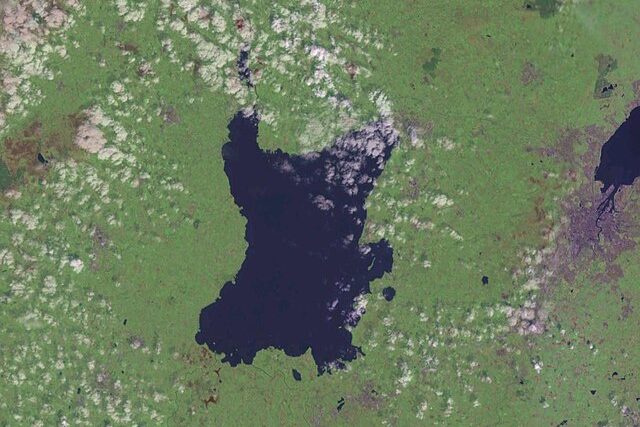
Lough Neagh, the largest freshwater lake in the UK and Ireland, is facing a dire environmental crisis caused by a rampant and toxic blue-green algae.
This ecological disaster is resulting in the death of fish, birds, and even posing a threat to dogs. Furthermore, there are grave concerns about public health, given that the lake supplies 40% of Northern Ireland’s drinking water.
Peter Harper, shoreline environment officer with Lough Neagh Partnership, says: “The lough at the minute, I would say, is in a state of emergency and we’re in a state of emergency too in a way in Northern Ireland because we don’t have a government.
“We don’t have an environment minister, we don’t have anyone to come out and see what’s happening.”
The primary culprit behind this dire situation is the proliferation of cyanobacteria, which is mainly fuelled by an excess of nutrients, particularly nitrates and phosphates stemming from agricultural runoff and sewage. The stench emanating from the lake is not only unbearable but also potentially hazardous.
Peter Harper, the shoreline environment officer at Lough Neagh Partnership, is deeply concerned and has labeled the situation as an “emergency.” He notes the added challenges because Northern Ireland currently lacks a functioning government.
Generations of families, like Gary McErlain’s, who have relied on the lake for their livelihoods, are heartbroken to witness its deterioration.
He says: “It’s devastating. We have fished from it, it’s been our livelihood, people just love it. Lough Neagh is cherished by many as a national treasure, and its current state is disheartening.
“To think that it’s crying looking [for] our help today and if it’s crying looking [for] our help, we have to do something to try and help it. We’ve broke it and now we need to try and fix it.”
The lake serves as a critical source of drinking water, with an extraction point beneath the surface. However, the water’s appearance is marred by a green algae-infested nutrient soup. Despite official assurances, public safety is a real worry.
“If we didn’t have the problem here, I would probably be offshore, open-water swimming,” explains Mary O’Hagan, who’s leading the call for an action plan.
She says: “The risks, to the best of my understanding, are things like headaches, dizziness, nausea.
“Long-term aspects, you can have things like liver damage, neurological damage, so it is not stuff to be played about with.”
Gavin Knox, who had to relocate his paddleboarding business due to the crisis, expresses anger over what he deems a “completely avoidable set of circumstances.” The water’s temperature increase, driven by climate change, is exacerbating the problem, and the presence of invasive zebra mussels further complicates matters. These mussels filter the water and enable sunlight to penetrate deeper, facilitating the growth of algae.
While various factors contribute to the crisis, the scientific consensus points to human activities as the primary driver. Decades of pollution without repercussions, coupled with political inaction, have pushed Lough Neagh to the brink.
Urgent and immediate action is imperative to address the grave issues plaguing Lough Neagh and safeguard this critical ecosystem.
Sinn Fein vice-president Michelle O’Neill said: “I have been listening to the local community, and will continue to work tirelessly to ensure that all agencies and departments work together to tackle the crisis at Lough Neagh as a priority.
“We are very lucky to have such an area of outstanding beauty and we must work together to unlock its full potential.”
——————————————————————————
At Natural World Fund, we are passionate about stopping the decline in our wildlife.
The decline in our wildlife is shocking and frightening. Without much more support, many of the animals we know and love will continue in their decline towards extinction.
When you help to restore a patch of degraded land through rewilding to forests, meadows, or wetlands, you have a massive impact on the biodiversity at a local level. You give animals a home and food that they otherwise would not have had, and it has a positive snowball effect on the food chain.
We are convinced that this is much better for the UK than growing lots of fast-growing coniferous trees, solely to remove carbon, that don’t actually help our animals to thrive.
This is why we stand for restoring nature in the UK through responsible rewilding. For us, it is the right thing to do. Let’s do what’s right for nature!
Donate today at https://naturalworldfund.com/ and join in the solution!

